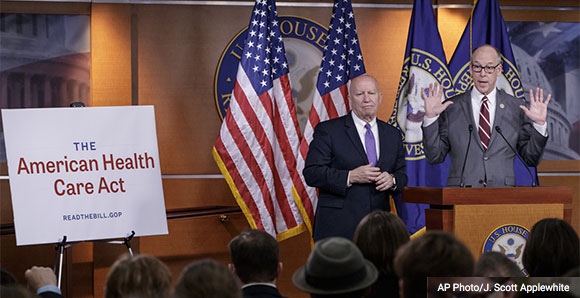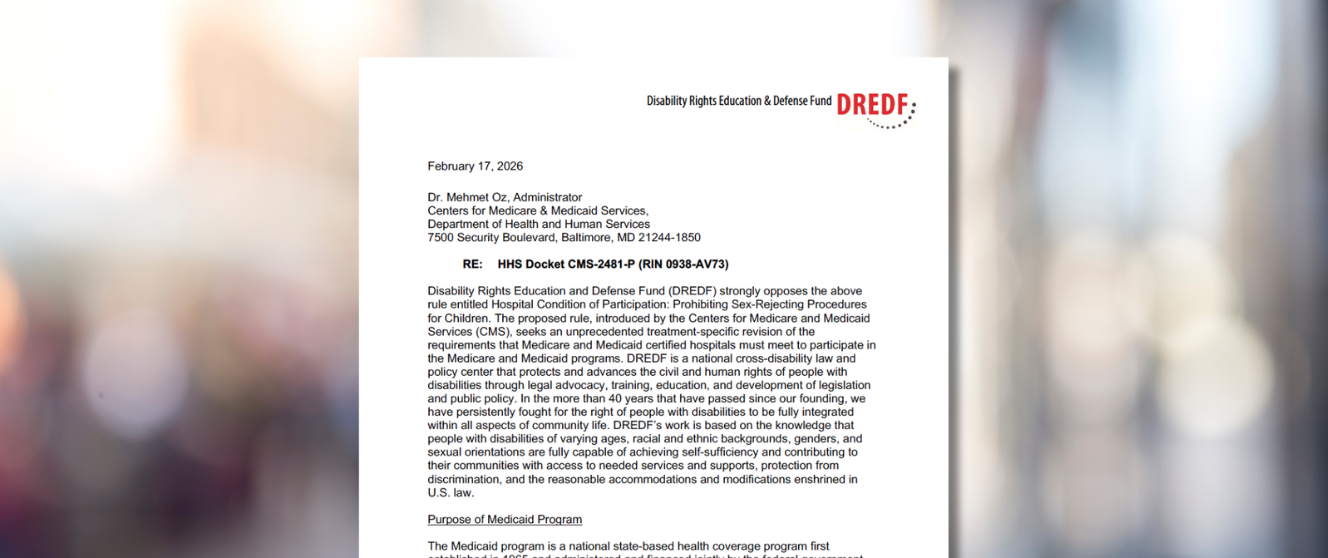
Tell Your Elected Officials To Oppose The American Health Care Act!

The American Health Care Act (AHCA) was introduced in the House of Representatives on March 6th and will soon be introduced in the Senate. The bill will hurt moderate and low–income people with disabilities and their families on two fronts:
- First, it repeals important parts of the Affordable Care Act that enable families of modest means to afford the reliable comprehensive coverage that people with disabilities need.
- Second, it imposes increasingly deep cuts on federal Medicaid funding that, over time, will strip needed care and services from low-income people with disabilities and prompt states to use cost-control measures such as waiting lists. Medicaid expansion will also be revoked by 2020.
DREDF joins AARP, The Arc, Bazelon Center for Mental Health Law, the Leadership Conference on Civil & Human Rights, Autistic Self Advocacy Network, the Consortium of Citizens with Disabilities, Justice in Aging, and other disability allies and supporters in strong opposition to the AHCA
Two House committees will start working on the bill today. Some details may change, but the main goals of ending, not replacing, the Affordable Care Act (ACA), and gutting, not refinancing, the Medicaid program are not expected to change.
A vote on the bill may be scheduled as early as the week of March 20, but this bill is not law
yet. Your voice can influence your Member of the House of Representatives, Senators and Governor to oppose the bill.
Please call and tell lawmakers that the American Health Care Act
will hurt people with disabilities.
Call your Members of Congress: 202-224-3121
Call the House Energy & Commerce Committee: 202-225-2927
Call the Senate Finance Committee: 202-224-4515
Call House Speaker Ryan: 202-225-0600
Contact your governor: https://www.usa.gov/state-governor
Talking Points:
Introduce yourself: As your constituent and a [person with a disability / parent of a child with a disability / supporter of people with disabilities], I oppose the passage of the American Health Care Act for two reasons:
1. The American Health Care Act would cut Medicaid!
Background for you: The ACHA changes the way that the federal government has funded Medicaid for over fifty years. Instead of paying a share of the actual healthcare provided to Medicaid–eligible people in the state, the federal government would set an absolute cap based on who received Medicaid in 2016. Regardless of how much additional care is needed by the people in a state as they age, become disabled, or as healthcare costs rise, the cap will remain. The cap is designed to produce cost savings even as the federal government gives up other sources of revenue by providing tax cuts to wealthy Americans and corporate healthcare entities. Millions of people with disabilities rely on Medicaid services, including long–term home–and–community based services that allow people with disabilities to live as independently as possible in their communities. Medicaid matters!
2. The American Health Care Act repeals the Medicaid Expansion!
Background for you: The Affordable Care Act (ACA) expanded Medicaid in many states to adults and children living at 138% of the Federal Poverty Level. People with disabilities who were previously ineligible for Medicaid because of slightly higher income or asset levels now had access to critical health coverage such as primary and preventive care, mental health and substance use disorder services, and community–based supports and services. A reduced reliance on emergency room services has led to cost savings for states and to increased employment for people with disabilities.[1] Moreover, from 2010–2015, the number of employed working-age adults with disabilities without insurance dropped from 1 million to 600,000. These gains for people with disabilities will be lost if Medicaid Expansion is repealed.
[1] Jean P. Hall et al., Effect of Medicaid Expansion on Workforce Participation for People with Disabilities,107 American Journal of Public Health 2, (Feb. 2017); Mike Krings, "Individuals with Disabilities More Likely to be Employed in States with Expanded Medicaid," University of Kansas (Dec., 21, 2016) available at: http://news.ku.edu/2016/12/08/individuals-disabilities-more-likely-be-employed-if-they-live-state-expanded-medicaid.

